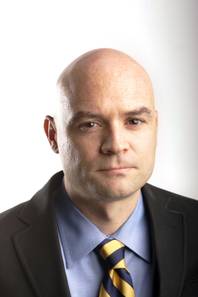Tuesday, Feb. 15, 2011 | 2 a.m.

J. Patrick Coolican
Sun Coverage
There’s always been an understanding that on the Strip, the game is rigged, that the suckers who come north on I-15 and through the gates of McCarran are our marks, be it on a slot machine or an overpriced pool cabana.
What’s become increasingly clear in the past few years, however, is that because of forces both within and outside our control, Las Vegas is rigged off the Strip, too — rigged against the middle- and working-class people who have worked hard, played by the rules and built this city. People such as Markus Stierwalt.
Stierwalt, who is 38 and a Rancho High School graduate, studied architectural drafting in college and, after bouncing around a few jobs, began to make his way in the construction industry, rising to project supervisor of commercial developments.
On Sept. 11, 2001, he saw the plane hit the second tower, and “I felt a calling.” He didn’t act on it right away, but “it never left my heart,” he told me over coffee last week.
In 2005, he was doing well, with a home, a wife and a son. Still, there was that calling. One day, he walked into a recruiting office and signed a contract with the Army National Guard.
As part of the 72nd Military Police Company, he shipped out for Iraq in 2007.
His unit moved detainees from one part of Iraq to another, by bus or by plane. They would sometimes transfer prisoners from a bus to a plane, leaving them exposed to mortars and other attacks. “You can’t react. The objective is to get the POWs on the plane. You have to protect them.”
He missed his son’s 8th and daughter’s 2nd birthday, his daughter’s first steps.
When he returned in October 2008, the Las Vegas economy was in free-fall, the result of the bursting housing bubble and the financial crisis on Wall Street. The construction job Stierwalt had lined up for his return was eliminated.
His father-in-law was able to give him some work at his landscaping company for a while, but that ran out.
Meanwhile, he watched his Army buddies deal — with varying levels of success — with the transition back to civilian life. A few showed signs of post-traumatic stress disorder. He credits his own fortitude amid the stress of his return to his wife’s patience and understanding, as well as his own deeply held religious faith.
Without work, he signed up for an Army hand-to-hand combat school, only to blow out a knee the night before the qualifying test. He passed anyway, but needed knee surgery. He had his surgery and completed physical therapy in September, which meant he was off active duty and in need of a job.
There are none to be had in construction. Stierwalt, who has the solid build of a soldier, spends his days keeping up his physical fitness and then on the computer, looking for a good job in security. He’s kept up relationships with subcontractors he once worked with, and occasionally gets a few days’ work from them.
During the good years, he and his wife saved a lot, so they’ve been able to keep up on the payments on the house they bought in 2001, which, naturally, is underwater — worth less than what they owe on it.
“I’m at peace because God has continually provided for us,” he said.
But this can’t go on forever, so he’s seriously considering volunteering for a deployment to Afghanistan, urged on by that calling to service, but also the more prosaic need to feed his family.
Even if a great job fell from the sky, Stierwalt is frustrated with what’s happened to his native city — his neighborhood racked by foreclosures and now filled with transient renters. “Garage doors are closed. People are never outside. They seclude themselves in their homes and disconnect themselves from any sense of community,” he said.
This is a common refrain from valley residents, but no less notable for being so.
After growing up in a pretty rough area, Stierwalt was proud to have saved enough to buy a house in a nicer neighborhood in the southeast valley. “I worked my whole life to get out of that, not to have people move in next door and throw trash in your yard.”
Stierwalt made sure to note that this isn’t about him, but about his fellow veterans. “This is to shed some light on people making that transition from a war zone to civilian life, and there’s not anything for them.”
But we needn’t restrict this conversation to veterans. Las Vegas is failing a lot of people.
Editor’s note: J. Patrick Coolican, who has been covering politics, the recession and a range of other subjects for the Sun since 2006, begins today as the Sun’s local columnist. He’s been a journalist since 2000, when he started a website to cover the presidential campaign.

Join the Discussion:
Check this out for a full explanation of our conversion to the LiveFyre commenting system and instructions on how to sign up for an account.
Full comments policy